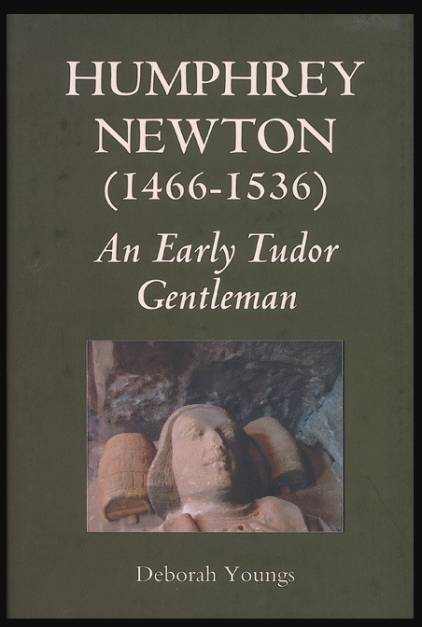In which we introduce the volume with the above title, by Deborah Youngs (2008, The Boydell Press, Woodbridge), to learn more about the written legacy of Humphrey Newton, my 13x gt grandfather. According to Youngs, he ‘belonged to a section of society conventionally labelled “the Gentry”: the lesser landowners located between the yeomanry and the peerage, and encompassing, by the late fifteenth century, the categories of knight, esquire and gentleman’.
How is it possible to discover a book’s worth of material on a man and his family, who, in their time, would have been well known locally, but hardly at all, further afield? And how did my ancestry, inhabited by such folk as iron workers, artisans, apothecaries, carriage painters and ministers of various faiths, come to acquire someone from the propertied classes? By the time my great grandmother, Humphrey Newton’s direct descendant, left these shores, she was a servant, grand-daughter of a failed apothecary who had faced bankruptcy and hardship in the early 19th century, and daughter of a ‘stationer’ father who, as far as we can ascertain, absconded to Australia, abandoning his wife and two very small children?
 I had not before known of the terms cartulary and commonplace book. Yet it is through these means, and other papers widely scattered through England’s various repositories and record offices, that we learn about Humphrey’s life and times. Folk who owned land and other property would have generated records such as deeds, settlements, wills, court records and related matter. Many of such documents can be found in record offices across the country. Deborah Youngs suggests that these are ‘overwhelmingly formal and impersonal, and generated by their landed interests’. (p. 3) Some of Humphrey’s records of these types were brought together and transcribed by Humphrey’s son William into a ‘cartulary’, ‘a collection of land deeds systematically arranged according to place/property [plus] … several genealogies, two rentals, and a poem’. (p. 4)
I had not before known of the terms cartulary and commonplace book. Yet it is through these means, and other papers widely scattered through England’s various repositories and record offices, that we learn about Humphrey’s life and times. Folk who owned land and other property would have generated records such as deeds, settlements, wills, court records and related matter. Many of such documents can be found in record offices across the country. Deborah Youngs suggests that these are ‘overwhelmingly formal and impersonal, and generated by their landed interests’. (p. 3) Some of Humphrey’s records of these types were brought together and transcribed by Humphrey’s son William into a ‘cartulary’, ‘a collection of land deeds systematically arranged according to place/property [plus] … several genealogies, two rentals, and a poem’. (p. 4)
Further, though, and on a more personal note, we find that Humphrey also kept a ‘commonplace book’, a rather random collection of differently sized pages. It is made up of 29 folios covering such things as ‘estate accounts, legal documents, land deeds, genealogies, prayers, chants, astrological charts, medical recipes, prophecies, literary extracts and love lyrics – a number of which are his personal compositions…it is very much a notebook, bitty, laconic, sometimes inscrutable…’. (pp 4-5) These, and other records researched by Youngs, allow the creation of a 230-page biography which looks at Humphrey ‘in the context of his family, the law, landownership, religion and cultural interests’. (p. 5)
By all accounts, Humphrey was not a remarkable man of his times. What was remarkable was the legacy he left – aided and abetted by various folk afterwards who compiled summaries and/or transcribed earlier versions – enabling an assiduous researcher to study his life and times in the round.
It will already be clear to readers of this post that I can do little more than offer a very brief and incomplete summary of Humphrey the man, as part of my exploration of this branch of my family tree. In the next post I will take a look at Humphrey’s own ancestry, and later on I will review just a few of the highlights of his life. I regret that the book I will use as source material appears to be available only through used book dealers, at some expense. I feel myself lucky to have acquired a copy, and highly recommend it to any of the very very many people who descend from him. It would be nice if it could be re-printed!
To recap, the book (from which page numbers cited above are taken) is: Humphrey Newton (1466-1536). A Early Tudor Gentleman. Deborah Youngs. The Boydell Press. Woodbridge, 2008. A search on the title brings up a website on which a preview can be seen, well worth seeking out:
A review of the book by Kitrina Bevan can be can be found through the same search – when I tried to copy and paste the url, it brought up the full article, which may be against copyright laws, so I leave it to the reader to search for it!